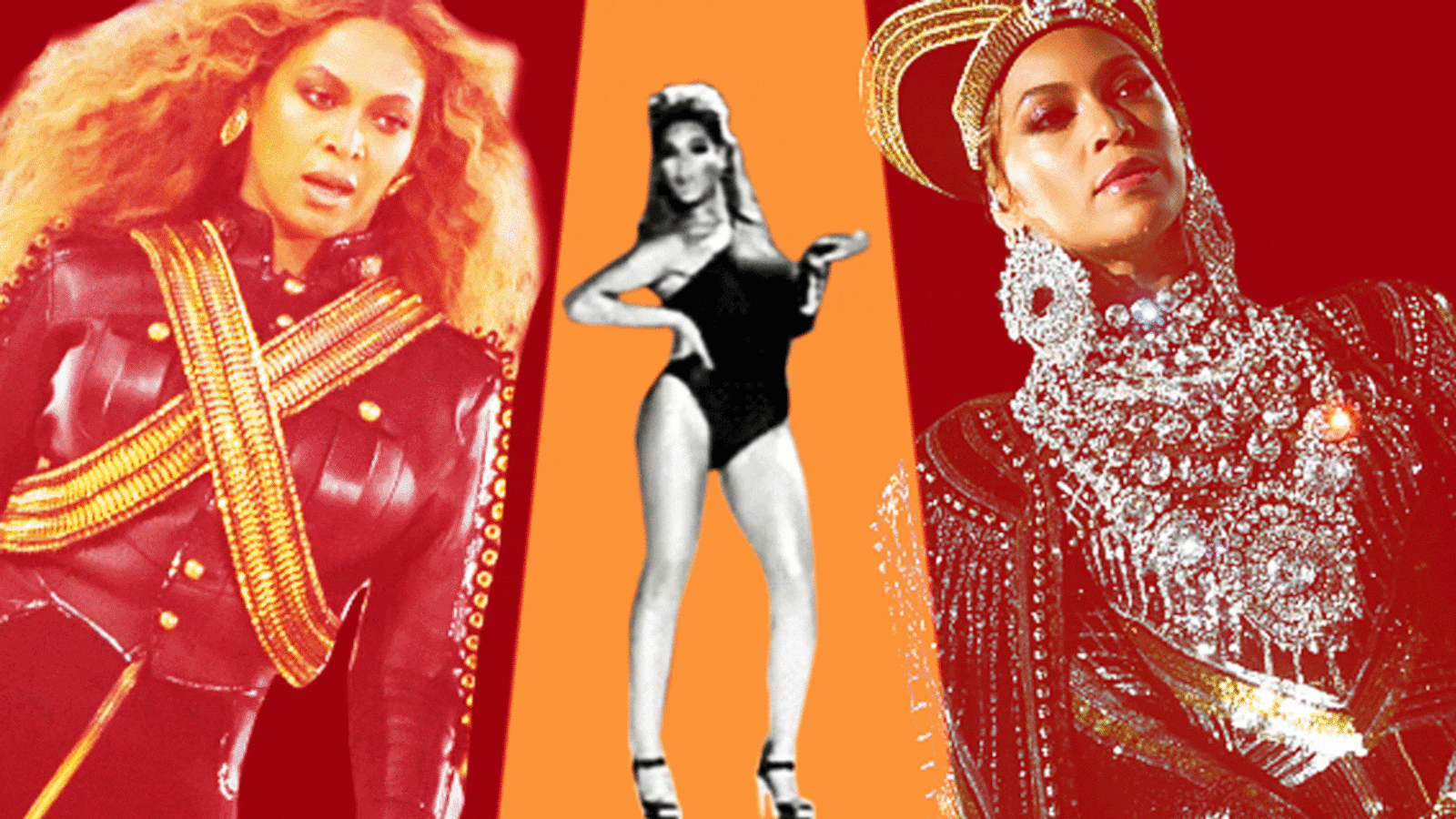In October 2008, Beyoncé released the single and video for “Single Ladies (Put a Ring on It).”
Its humongous hook and Bey’s staccato delivery laid the drumbeat for a jubilant, rallying message of female agency. The song shot straight to No 1, is widely considered to be one of the best tracks of the new millennium, and, a decade later, remains an indelible, unshakable part of pop culture. And the accompanying black-and-white music video? As Kanye West notoriously proclaimed, “Beyoncé had one of the best videos of all time!”
Yet for all the superlatives that can and should be showered on the song, its popularity, and Beyoncé’s success with it—a peak of any other artist’s career—it was all just the beginning. The next 10 years would find the pop supernova ascending to an entirely new level of artistry and celebrity, a reign at the top of pop music that would challenge society’s perceptions of race, gender, and power.
She would set records and log a series of “firsts” for Black female entertainers. Scandal and controversy would find her family—on one occasion in an elevator—and she’d turn it into art that examined what it means to have a marriage. Her music would examine her lineage, her culture, her blackness, and her womanhood, forever changing the industry’s ideas of how an album is released and consumed in the process, be it with a surprise drop or the concept of the visual album.
She would deliver some of the most electric live performances ever to hit a stage, igniting firestorms of both praise and backlash with her unapologetic incorporation of Black history and social justice into her work. She would find and use her political voice, shut down the Louvre, and send collective chills up the world’s spine with just the news that she would voice Nala in a live-action The Lion King.
She would ascend to a status so hallowed as to be nearly mythological, a deity we speak about almost exclusively in hyperbole, reacting as her guiding hand would completely change culture.
When she became the first Black woman to headline the Coachella Music Festival this spring, the raucous stage show became a tribute to historically black colleges and universities. After she was given “unprecedented control” over Vogue’s iconic September issue, on which she appeared on the cover with the headline “Everyone’s Voice Counts,” we saw the historic fruits of that control: the hiring of the first Black photographer to ever shoot the cover in the magazine’s 126-year history, in 23-year-old Tyler Mitchell, and an as-told-to cover story that allowed the star to speak about body image, pregnancy, her ancestry, and her heritage in her own words.
In 10 years, Beyoncé has released four albums (plus one this summer with her husband, Jay-Z), won 12 Grammy Awards, headlined or co-headlined five tours, performed for the first dance at Barack Obama’s first inauguration and sung the national anthem at the second, fronted two Super Bowl halftime shows, launched a clothing line, become a powerful voice for the Black Lives Matter movement, gotten married, and given birth to three children. Even that isn’t a complete list of accomplishments and successes, just points on the resume of a legacy still being written.
What’s remarkable about that legacy, particularly in the last few years, is her desire to be an active participant in crafting it. There’s the fact that she commanded full control over her recent Vogue cover, for example, to ensure that her message gets out the way she wants to direct it, or that when a documentary was made about her life and career, 2013’s Beyoncé: Life Is But a Dream, she was its director.
She rarely gives interviews, should her words be misrepresented. Her last Vogue cover, in 2015, was the rare instance of a cover subject not being interviewed for the accompanying story, an homage penned by Pulitzer Prize-winning writer Margo Jefferson.
Rebutting the candor and relentless access and communication that has come to define the rise of the modern celebrity, her remove lent her mystery and a semblance of privacy, sure, but also a pedestal from which her art and its message could seemingly carry greater importance. She’s one of the last remaining stars who doesn’t deliver soundbites, but who makes statements: What does it mean to be Black, female, #flawless, or, as she stood in front of the world during a MTV Video Music Awards performance, a feminist?
In live performances, she would become self-historiographer, be it in proving her transcendence—performing her entire album, for example, at an award show—or charting her rise to pop royalty while also chronicling her journey to embracing her blackness at that history-making Coachella set.
When she styles herself in the image of the African goddess Oshun, a deity of sexuality and fertility, while performing pregnant with twins at the Grammy Awards, she knows what that means. When she leads a troupe of dancers wearing Black Panther berets, referencing the Black Lives Matter movement and Malcolm X at a Super Bowl Halftime Show, she knows what that means. When she posts on Instagram about Black Lives Matter, bails out protesters in Baltimore and Ferguson, invites mothers of police shooting victims to appear in Lemonade, or publicly states #ImWithHer, she knows what that means—and the risk of controversy it might cause.
As her personal life became intertwined with her impact, she made art that combined the two to make a statement. A family interaction in an elevator and whispers that Jay-Z had cheated on her started a rumor mill that churned with enough speed to act as a stage floor fan at one of her tours. So she made an album about it, Lemonade, building a bridge between her journey of pain and healing after her husband’s affair and broader cultural issues of racial injustice, rage, and identity, populating the accompanying album with powerful Black imagery.
In a business in which celebrities, women especially, become defined by narratives, she threaded hers together into a triumphant work of catharsis and empowerment, carrying us collectively across that emotional threshold with her. As Jamilah King wrote for Mic.com, Beyoncé found the poignance in her power, particularly as a Black female artist: “the ability to control the art that you put into the world, the way that you interact with fans and the way that those fans consume what you give them.”
It speaks to the value and immediacy of Beyoncé’s work and her fight for that control that, despite the seminal nature of Lemonade and the acclaim it received, she failed to win Album of the Year (again) at the Grammy Awards in 2017. Even when the greatest entertainer of her generation proves her worth in a landmark way, she is denied her owed recognition.
“We all experience pain and loss, and often we become inaudible,” Beyoncé said in her acceptance speech for Best Urban Contemporary Album, a category which she did win. “My intention for the film and album was to create a body of work that would give a voice to our pain, our struggles, our darkness, and our history. To confront issues that make us uncomfortable.”
“It’s important to me to show images to my children that reflect their beauty,” she continued, “so that they can grow up in a world where they can look in the mirror, first at their own families as well as the news, the Super Bowl, the Olympics, the White House, and the Grammys, and see themselves, and have no doubt that they’re beautiful, intelligent, and capable. This is something that I want for every child of every race, and I feel it’s vital we look at this past and recognize our tendencies to repeat our mistakes.”
For Beyoncé, the power of the work, and of these last 10 years, isn’t always in the validation, but in the visibility. It’s there that her legacy is written.
Keep Reading for more Daily Beast 10th Anniversary Coverage:








